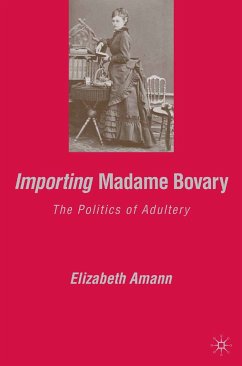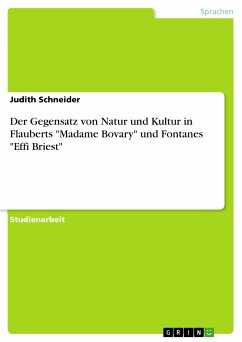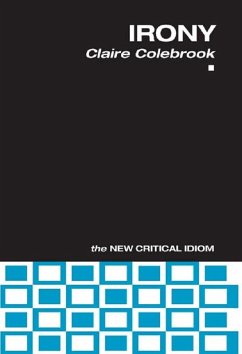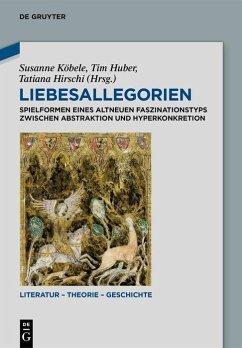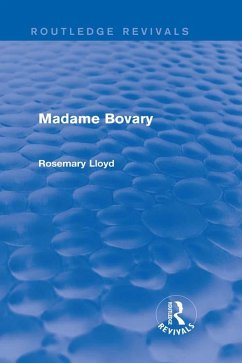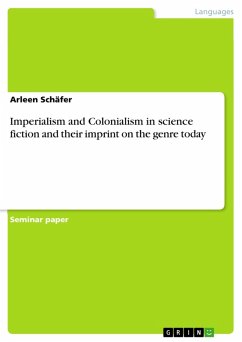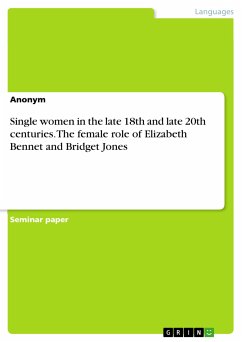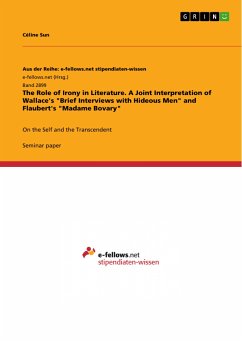
The Role of Irony in Literature. A Joint Interpretation of Wallace's "Brief Interviews with Hideous Men" and Flaubert's "Madame Bovary" (eBook, PDF)
On the Self and the Transcendent
Sofort per Download lieferbar
Statt: 15,95 €**
13,99 €
inkl. MwSt. und vom Verlag festgesetzt.
**Preis der gedruckten Ausgabe (Broschiertes Buch)
Alle Infos zum eBook verschenkenWeitere Ausgaben:

PAYBACK Punkte
0 °P sammeln!
**Preis der gedruckten Ausgabe (Broschiertes Buch)
Seminar paper from the year 2018 in the subject Literature - Comparative Literature, grade: 1,7, University of Cambridge (Faculty of Divinity), course: Religious Themes in Literature, language: English, abstract: By drawing on an existing study on existentialist engagement in David Foster Wallace's oeuvre to make a connection to "Madame Bovary", this essay will argue for and examine the similarity of the problems illuminated in the two works as they both deal with the relation between the sense of self and the acknowledgment of a transcendent reality. The focus will be on "Madame Bovary". At f...
Seminar paper from the year 2018 in the subject Literature - Comparative Literature, grade: 1,7, University of Cambridge (Faculty of Divinity), course: Religious Themes in Literature, language: English, abstract: By drawing on an existing study on existentialist engagement in David Foster Wallace's oeuvre to make a connection to "Madame Bovary", this essay will argue for and examine the similarity of the problems illuminated in the two works as they both deal with the relation between the sense of self and the acknowledgment of a transcendent reality. The focus will be on "Madame Bovary". At first sight, the ironic character of "Madame Bovary" appears to be susceptible to Wallace's criticism of irony. I will show that, despite his use of irony, Flaubert is ultimately as committed to recognizing a transcendent reality through his writing. Gustave Flaubert's "Madame Bovary" and David Foster Wallace's "Brief Interviews with Hideous Men" were written nearly 150 years apart. Flaubert, on the one hand, is often categorized within the tradition of realism - a label that he himself rejected - which followed a literary period of romanticism. On the other hand, Wallace, as a contemporary writer, enters a stage that is dominated by postmodern thinking. Both their writings are shaped by their critical engagement with the literary movement and social reality of their time and the protagonists of their writings are created as prototypes of the mind-set they seek to criticize through literary reflection. Due to the differences in their literary context, however, it seems natural to assume that the two writers have very different literary agendas. Flaubert appears to propose through his writings a radical dissociation in face of and opposition to both the escapist tendencies of romantic novels and the reality of bourgeois society of his time, whereas Wallace criticizes the exact tendency of ironic dissociation as they have become rife in post-modern literature.
Dieser Download kann aus rechtlichen Gründen nur mit Rechnungsadresse in A, B, BG, CY, CZ, D, DK, EW, E, FIN, F, GR, HR, H, IRL, I, LT, L, LR, M, NL, PL, P, R, S, SLO, SK ausgeliefert werden.





